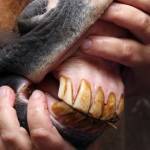Peripheral Dental Caries: What Do They Mean for My Horse?

Over the past few years, the prevalence of peripheral dental caries has risen, and horse owners are becoming more concerned about the effects of these tooth defects.
Dental caries are defined as “decalcification of calcified dental tissues by microbial acids, with resultant microbial destruction of the organic matrix.” Layman’s terms, please? Dental caries are cavities or areas of tooth decay.
“We believe that the percentage of horses eating more high-carbohydrate diets has increased the incidence of peripheral dental caries,” said Laura Petroski-Rose, B.V.M.S., a Kentucky Equine Research staff veterinarian. As carbohydrates ferment, the mouth becomes acidic, compromising the surface integrity of the teeth. “The acidic environment erodes the surface of the tooth, which then allows the microbes to degrade the tooth further, resulting in caries.”
A recent study* performed at the Royal (Dick) School of Veterinary Studies and the Roslin Institute in Scotland, examined 101 postmortem heads to determine the presence, intraoral distribution, and severity of peripheral caries in horses. Over 90% of these horses had peripheral caries, with all affecting only the cheek teeth, known also as molars. Approximately 73% of the lesions were thought to affect the tooth only mildly, and unless the caries progressed to encompass or erode more of the tooth, minimal clinical signs would result from their presence.
“In summary, most horses will have peripheral caries, but the presence of these caries should not cause serious problems. It is wise to have your veterinarian perform a dental exam on your horse every year to identify these lesions and monitor them over the course of a lifetime,” said Petroski-Rose.
Meanwhile, sound nutrition is paramount. Owners can often reduce the level of concentrates in horses that are obese or on a break from training. For these types of horses, consider a low-intake concentrated source of vitamins and minerals for mature horses. These are ideal for horses that maintain body weight on diets composed entirely of forage or forage and small amounts of concentrate.
All-Phase is a suitable choice for horses not requiring extra energy from concentrates. All-Phase is a highly digestible source of protein, vitamins, and minerals. This ration balancer pellet is formulated to provide required levels of micronutrients at a low intake. All-Phase is fortified with KER micronutrients to include natural-source vitamin E, chelated trace minerals, B vitamins, biotin, yeast culture, and organic selenium.
Lee L., J.M. Reardon, and P.M. Dixon. 2017. A post-mortem study on the prevalence of peripheral dental caries in Scottish horses. Equine Veterinary Education. 31:96-101.








